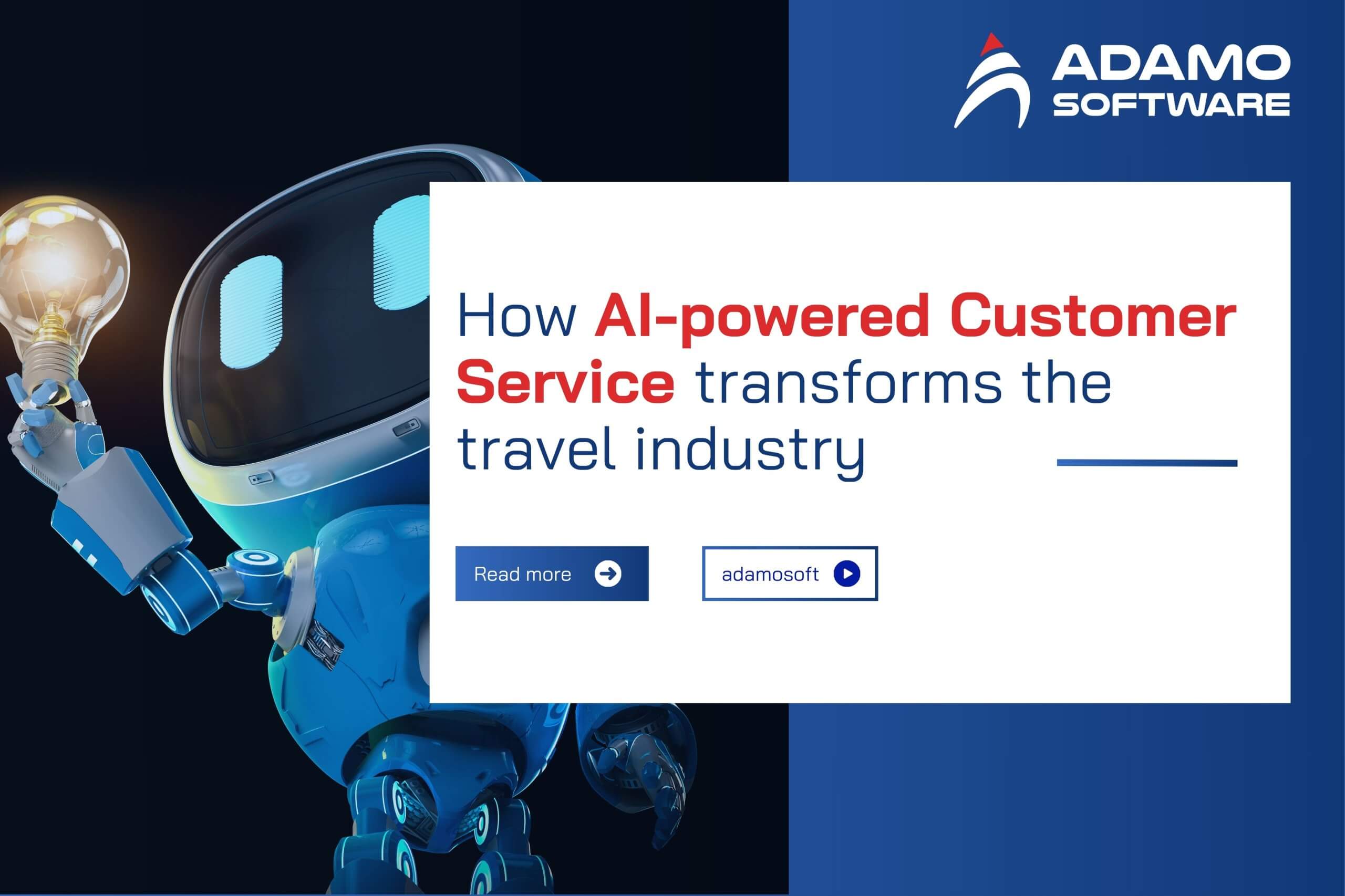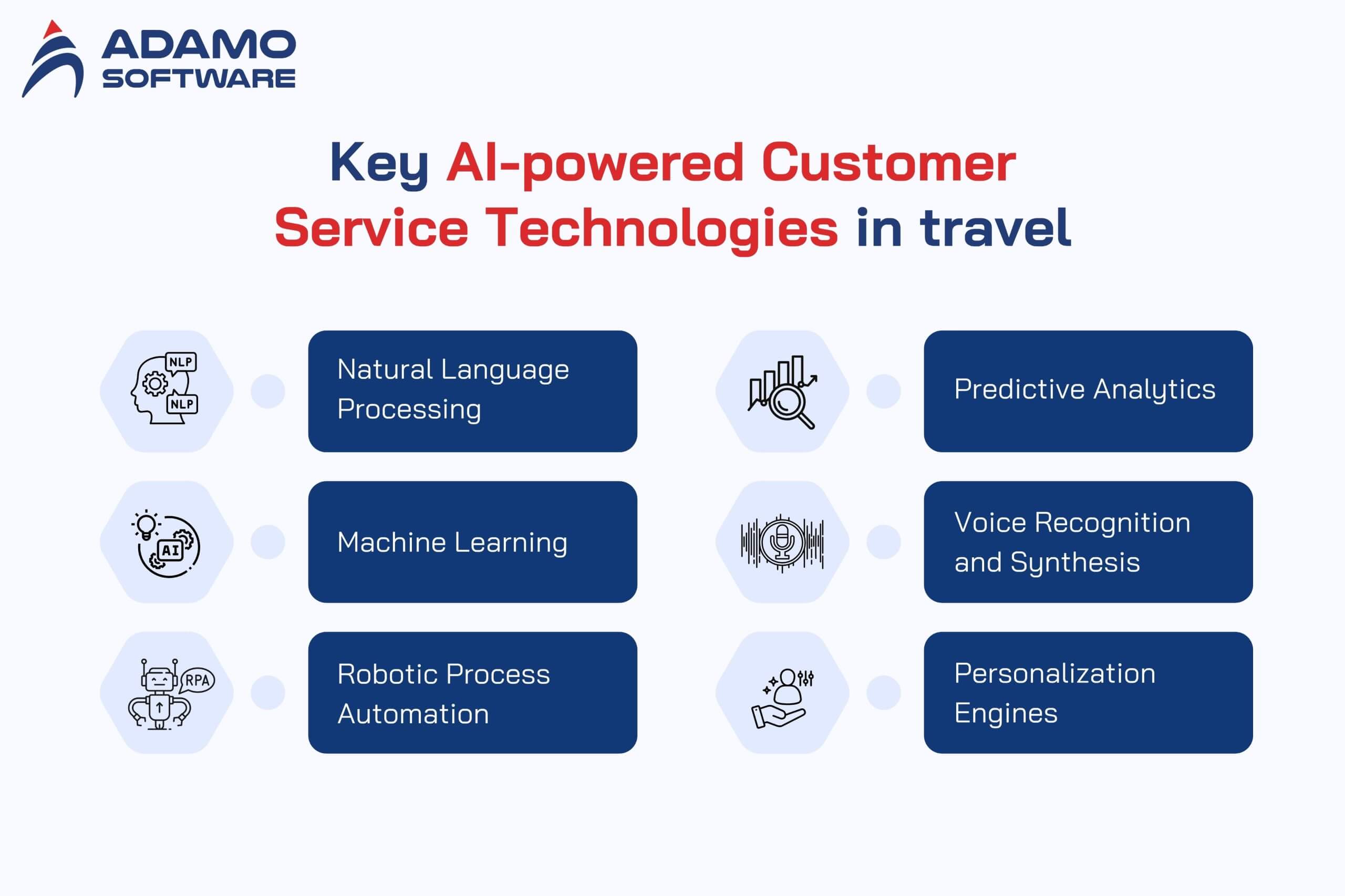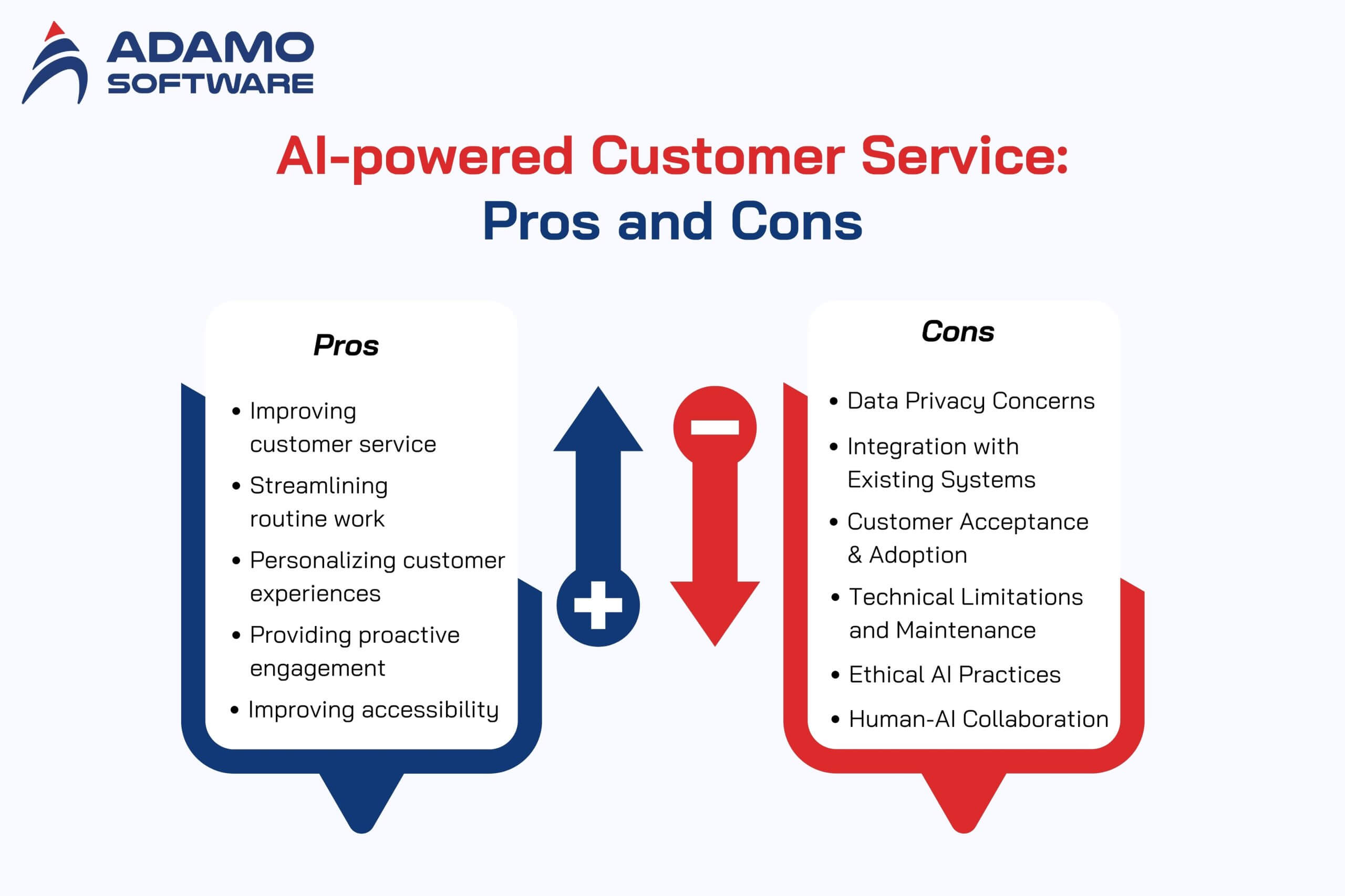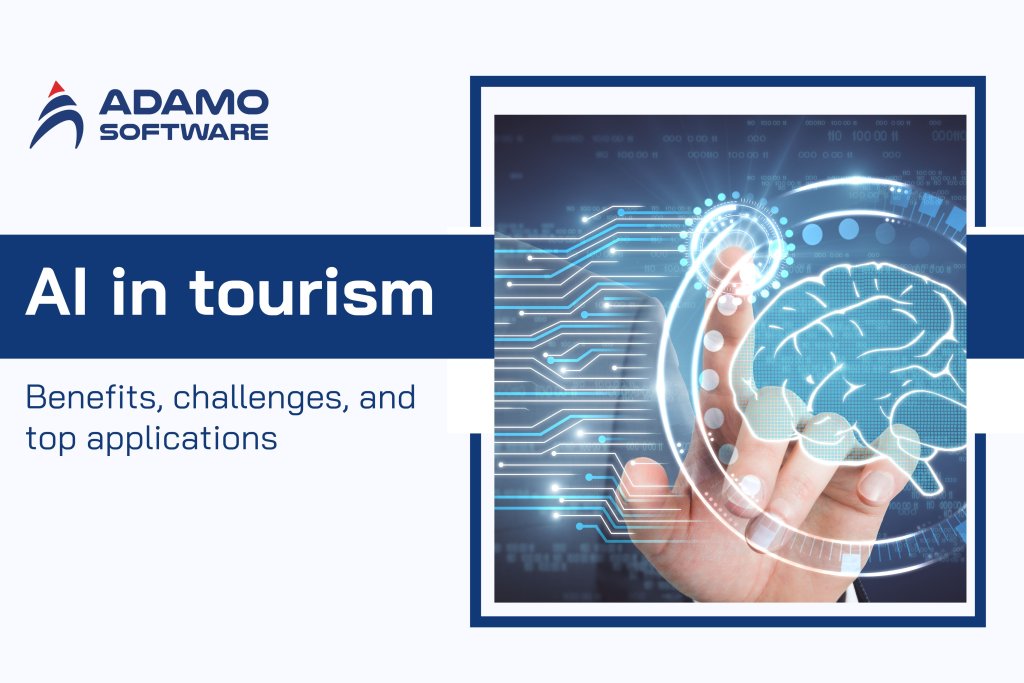How AI-Powered Customer Service is transforming the travel industry

AI-powered customer service is one of the outstanding applications of AI in the industry. Let’s find out detailed information about this technology!
Currently, Artificial Intelligence (AI) has become an essential technology for many industries, including the travel industry. AI-powered customer service is one of the outstanding applications of AI in the industry, leveraging AI to improve customer support, optimize operations, and deliver personalized, real-time travel assistance.
AI-powered tools like AI chatbots, AI travel assistants, Travel Recommendation Engine, and AI travel agent allow travel companies to handle booking requests, resolve customer issues, process cancellations, and deliver round-the-clock support. Let Adamo Software discuss more detailed information about AI-powered customer service.
Through this blog post, you will find out the following pieces of information.
- Key Ai-powered Customer Service Technologies in travel industry
- Benefits of Travel AI-powered Customer Service
- Challenges with AI in travel customer service (Solutions included)
- Successful examples of AI in Travel Customer Service
- What’s to look forward to in the future for AI customer service in travel?
All information has been thoroughly researched and updated to the latest trends. So, let’s read our blog post and find some useful information!
I. Key AI-powered Customer Service Technologies in travel industry
Thanks to AI applications, supporting, consulting and handling tourists’ requests becomes faster, more accurate and more personalized. Below are some key AI-powered customer service technologies that can be helpful in the travel industry.

- Natural Language Processing (NLP) – Understand language, support customers
- Machine Learning (ML) – Smart analysis and suggestions
- Robotic Process Automation (RPA) – Optimizing service processes
- Predictive Analytics – Predicting risks and optimizing experiences
- Voice Recognition and Synthesis – Voice interaction
- Personalization Engines – Understanding customers and proposing the right needs
Let’s delve into each technology with Adamo Software!
1. Natural Language Processing (NPL)
NPL is one of the most important AI-powered customer service technologies for travel companies. With NLP, AI systems can naturally understand and respond to customer questions just like humans. Travel companies use AI chatbots and virtual assistants with NLP to provide instant help for bookings, flight updates, hotel stays, and more. NLP-driven systems deliver accurate, context-sensitive responses that closely replicate human conversation.
2. Machine Learning (ML)
ML is also among the AI-powered customer service technologies that you should adopt for your travel company. This technology allows AI systems to analyze customer behaviors and preferences, generating personalized travel suggestions, and refining responses through past interactions. In the travel industry, ML-powered systems continuously learn from customer data, enabling them to deliver more tailored travel solutions and enhance the overall user experience.
3. Robotic Process Automation (RPA)
RPA is also on the list of the notable AI-powered customer service technologies that travel businesses should use for smooth operation. RPA streamlines repetitive processes in travel customer service, including booking management, payment processing, and itinerary updates. AI-powered RPA helps travel companies complete tasks quickly and accurately, reducing errors and improving service speed.
4. Predictive Analytics
Predictive analytics tool is one of the indispensable AI-powered customer service technologies for the travel industry. Using predictive analytics, AI helps travel companies foresee disruptions such as flight delays, bad weather, or cancellations before they happen. This enables AI-powered customer service systems to proactively inform travelers of potential issues and propose alternative solutions, thereby enhancing communication and customer satisfaction.
5. Voice Recognition and Synthesis
In the travel industry, AI-powered customer service systems employ voice recognition to interpret spoken language and voice synthesis to generate verbal responses. With this technology, travelers can use voice commands to get flight details, handle bookings, or check in, making service faster and easier.
6. Personalization Engines
AI-powered customer service also needs personalization engines technology to help travel businesses attract more customers. Using AI personalization, travel companies can understand each traveler’s preferences and deliver tailored recommendations for flights, hotels, and experiences. This level of personalization helps create a more tailored and engaging customer experience.
In general, AI-powered customer service is gradually changing the way tourism businesses interact and take care of customers. All technologies mentioned above, from natural language processing (NLP) to help systems understand and respond to tourists’ questions, machine learning to analyze behavior to provide personalized suggestions, to robotic process automation (RPA) to optimize repetitive tasks, contribute to improving operational efficiency. In addition, predictive analytics helps identify problems early, voice recognition provides a more convenient interactive experience, and AI personalization creates itineraries that suit each customer’s preferences.
II. Benefits of Travel AI-powered Customer Service

AI-powered customer service is transforming the way travel businesses interact with their customers, offering efficiency, accuracy, and a seamless experience throughout the journey. Let’s explore some outstanding benefits of travel AI-powered customer service with Adamo Software! From our blog post, you will know about these advantages below.
- Improving customer service – Reduced wait times, instant support
- Streamlining routine work – Automating repetitive tasks
- Personalizing customer experiences – Suggesting itinerary based on preferences
- Providing proactive engagement – Flexible updates and support
- Improving accessibility – Multi-language, multi-platform support
Let Adamo Software discuss more detailed information about each benefit.
1. Improving customer service
Improving customer service is one of the notable benefits of travel AI-powered customer service technology. In the travel sector, AI-powered customer service technologies are a game-changer, delivering faster issue resolution and shorter wait times that significantly boost customer satisfaction. They deliver 24/7 support and unmatched convenience, letting travelers handle needs like booking an urgent flight or late-night hotel check-in whenever it suits them. They offer instant, device-agnostic support, eliminating the wait for human agents. This creates a seamless experience that translates directly into faster issue resolution and higher customer satisfaction.
2. Streamlining routine work
AI-powered customer service technologies help your customers streamline their routine work. They can now directly manage account changes, query basic information, and submit identity verification using AI chatbots, all without agent intervention. By automating these interactions, you ensure that customers and your service team stop wasting time on repetitive tasks and can shift their attention to resolving intricate challenges.
3. Personalizing customer experiences
Personalizing customer experiences is the most effective usage of AI-powered customer service. Conversational AI analyzes user data and recognizes intent to detect travel patterns, resulting in highly personalized recommendations.
By suggesting relevant destinations, accommodations, and activities, AI-powered customer service technologies personalize travel planning to align with each user’s specific preferences. The technologies enable chatbots to deliver personalized itineraries and timely reminders for key travel moments, including flight departures and hotel check-in times.
4. Providing proactive engagement
When you leverage AI-powered customer service, you can provide proactive engagement for your customers. The travel sector is highly volatile; a customer booking can change at a moment’s notice due to anything from personal circumstances to storms or political instability.
With the AI-powered customer service technologies, you can provide vital support by alerting the customer to the change and immediately guiding them through amendments or alternative booking options. This approach not only ensures customer satisfaction but also helps your business protect revenue and significantly boost future retention rates.
5. Improving accessibility
By handling and translating conversations in the customer’s native tongue, AI-powered customer service technologies ensure that language barriers are eliminated and all customers receive seamless support. Chatbots ensure maximum accessibility by offering support across multiple devices and platforms, including websites, mobile apps, and social media, meeting customers where they prefer to interact.
Generally, AI-powered customer service in the travel sector delivers diverse advantages, including cutting wait times, automating repetitive tasks, and providing personalized travel recommendations. Besides, these technologies enable flexible booking changes and support customers across multiple languages and platforms, ultimately boosting both satisfaction and business efficiency.
III. Challenges with AI in travel customer service (Solutions included)
While AI is bringing many outstanding benefits to customer service in the travel industry, implementing AI-powered customer service in the travel industry also faces many challenges. However, if applied correctly, businesses can completely overcome these barriers to maximize the potential of AI. Let’s explore some challenges with AI in travel customer service and solutions to deal with Adamo Software!
Here are some threats that you may come up with.
- Data Privacy Concerns – Complying with data security
- Integration with Existing Systems – Difficulty integrating AI with legacy systems
- Customer Acceptance and Adoption – Customers hesitate to interact with AI
- Technical Limitations and Maintenance – AI performance problem
- Ethical AI Practices – Risk of data bias
- Human-AI Collaboration – Balancing AI and human resources
Let’s find more detailed information about each challenge and how to deal with them!
1. Data Privacy Concerns
Data privacy is one of the largest challenges of implementing AI-powered customer service.
AI relies on the collection and analysis of customer data, including personal information and transaction history, which requires businesses to strictly comply with data protection regulations such as GDPR. This not only helps ensure the safety of sensitive information but also maintains customer trust.
Smart solution:
To address this, businesses need to implement measures such as data encryption, strict access management, and regular system audits to ensure compliance with regulations.
2. Integration with Existing Systems
Integrating AI with existing systems is also a challenge of implementing AI-powered customer service. These systems often lack flexibility and are not fully compatible with modern AI technology, leading to difficulties in connecting data and synchronizing processes. If not handled properly, this can disrupt operations and increase implementation costs.
Smart solution:
Through thorough assessments, custom API development, and rigorous testing, AI-powered customer service can be smoothly implemented without disrupting the businesses’ operation.
3. Customer Acceptance and Adoption
Customer acceptance and adoption is also a popular disadvantage of using AI-powered customer service. Many travelers still hesitate to use chatbots or virtual assistants as they trust humans more. This can reduce satisfaction levels and usage rates of automated channels.
Smart solution:
To overcome this, businesses should combine AI and humans in the customer care process. Besides, businesses should continuously optimize chatbot language, responses, and experiences to increase naturalness and trust.
4. Technical Limitations and Maintenance
Another significant challenge of AI-powered customer service is the technical limitations and ongoing maintenance requirements of AI technology. AI depends on the quality of data and the trained algorithms, which are prone to errors if not updated regularly. In addition, maintaining stable performance requires businesses to invest in infrastructure, technical personnel and regular monitoring processes.
Smart solution:
Continuous monitoring, updates, and troubleshooting ensure the AI operates optimally, minimizing downtime and providing travelers with a truly seamless experience.
5. Ethical AI Practices
Bias in AI systems is also one of the key challenges of adopting AI-powered customer service technologies. When AI is trained on biased data, it can make subjective decisions or recommendations. In the travel industry, this can lead to prioritizing the wrong customers or creating unfair experiences.
Smart solution:
Businesses can deal with this problem by conducting regular audits and bias assessments to proactively identify and mitigate potential biases.
6. Human-AI Collaboration
Balancing the role of humans and AI also needs to be considered. Clearly defining the boundaries and coordinating between the two requires appropriate management and training. Businesses may want to design a harmonious hybrid process, where AI handles repetitive or basic requests, while humans take on complex situations, to optimize efficiency.
In summary, the application of AI-powered customer service in the travel industry brings many opportunities but also comes with many challenges in terms of data security, system integration, and customer trust. Businesses need a comprehensive implementation strategy, combining technology, people, and effective management processes to fully exploit the potential of AI.
Ready to Outsource?
Get top-tier IT talent without the hassle. Contact us now!
IV. Successful examples of AI in Travel Customer Service
AI-powered customer service can be used by online travel agents (OTAs), airlines, and hotels. Let Adamo Software discuss some successful examples of AI in travel customer service.
1. OTAs
Expedia and Booking.com are two notable OTAs that have successfully adopted AI-powered customer service. Utilizing Natural Language Processing (NLP), the “Expedia Assistant” chatbot understands customer requests, answers questions, suggests personalized flights and hotels, and facilitates the entire booking process within a single chat window. This dramatically increases efficiency and guarantees 24/7 support. Whereas, Booking.com’s AI algorithms analyze tourists’ past history and preferences, including booking data and browsing behavior, to recommend flights, hotels, and activities specifically tailored to their interests, significantly boosting the booking experience and customer satisfaction.
2. Airlines
Currently, many airlines are using AI-powered customer service technologies for smooth operation. The two outstanding examples include Dutch’s KLM Airlines and American Airlines.
- KLM Airlines
KLM’s “KLM Messenger” chatbot is seamlessly integrated with platforms like Facebook Messenger and WhatsApp. It provides passengers with real-time flight updates, check-in details, and basic booking modifications, offering convenient customer service on widely used social channels.
- American Airlines
American Airlines enhances its customer service and operational efficiency through AI. They use machine learning for sophisticated schedule forecasting and better rebooking options. The company’s future strategy includes deploying Generative AI to deliver even more advanced self-service.
3. Hotels
Like OTs and airlines, hotels are increasingly using AI-powered customer service to enhance customer satisfaction. Hilton Hotels and Marriott International are two impressive examples.
- Hilton Hotels
Hilton’s AI-powered virtual concierge, “Connie,” uses Natural Language Processing to fully comprehend guest requests. This capability allows guests to book rooms, make service requests, or get recommendations for nearby attractions, streamlining communication and reducing service wait times.
- Marriott International
Marriott uses AI chatbots across its customer service channels to handle room bookings, address FAQs, and offer personalized recommendations. This approach is driven by analyzing guest preferences and past stays, resulting in a more efficient and customized guest experience.
V. What’s to look forward to in the future for AI customer service in travel?
In the future, AI-powered customer service in the travel industry will become increasingly intelligent and proactive. Thanks to real-time data analysis, AI can predict travelers’ needs, from suggesting the right destination to assisting with last-minute changes. The combination of AI and technologies like IoT or augmented reality (AR) will also help enhance the experience, creating seamless and personalized journeys. AI could personalize recommendations further, suggesting everything based on tourists’ past reviews.
In addition, AI also plays a strategic role in optimizing management and decision-making of tourism businesses. Through analyzing customer behavior, forecasting tour booking trends and evaluating feedback, AI helps companies adjust products, prices and marketing campaigns more flexibly. Automating service processes also helps save operating costs and improve service quality.
VI. Final thoughts
In conclusion, AI-powered customer service is reshaping the way the travel industry interacts with and serves customers. Thanks to the combination of advanced technologies, businesses can deliver experiences faster, more personalized, and more efficiently than ever before. In the future, AI will continue to grow strongly, becoming the core platform that helps travel businesses improve service quality, optimize operations, and build sustainable relationships with global customers.
If you are looking for a partner to help you integrate AI-powered customer service into your system, Adamo Software, as one of Vietnam’s leading travel and hospitality software development companies, can be your ideal choice. Here’s how we can help.
- Analyze AI-powered customer service strategy
- Developing and customizing smart chatbots for AI-powered customer service
- Integrating AI with existing systems
- Applying data analytics and machine learning
- Deploying and maintaining AI-powered customer service system
- Ensuring compliance with data security and regulations
Still hesitating whether to choose Adamo Software? Let’s contact us for more detailed information!
FAQs
1. Which technological innovation has significantly transformed customer service in the tourism industry by providing 24/7 support?
AI-powered chatbots and virtual assistants have revolutionized customer service in tourism by offering instant, round-the-clock support. These tools handle inquiries, bookings, and itinerary updates without human intervention, improving response time and customer satisfaction. For travel businesses seeking custom automation aligned with their brand tone or multiple languages, partnering with an outsourcing development service can ensure a fully tailored AI support system.
2. How can you secure your data when adopting AI for customer service?
You can protect customer data while using AI for support by:
- Implementing end-to-end encryption for all communicationsAuditing system security on a regular basis
- Using transparent, explainable AI models
- Removing personal identifiers from training data
- Applying data tokenization so information is machine-readable only





